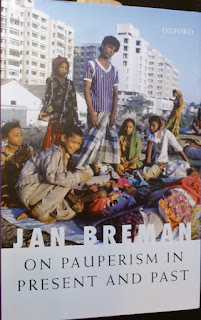This book review was written by Eugene Kernes
“Remaining footloose and being prepared for shorter or longer sorties nearby or far away is not conditioned by an innate inclination to vagrancy, of which paupers stand accused wherever and whenever, but propelled by the dire need to scratch around for work hoping that the return will net enough for sheer survival.” – Jan Breman, Introduction, Page 2
“What the aid workers failed to do was give conclusive answers to questions about how things were to proceed from then on: how long the people would have to stay at the camp, who would actually decide that, where they would go from there, and where they could get more information on all these matters. When the period of emergency aid came o an end, all the organizations that had provided it also disappeared.” – Jan Breman, Chapter 3: Clearing the City of the Undeserving Poor, Page 95
“When the union leaders filed a protest and met with the office-in-charge, he profusely apologized and confessed tat the charges against the workers were drummed up and had been instigated by the Superintendent of Police himself under pressure from wealthy residents of a posh colony nearby who experienced the ‘unruly mod’ daily gathering at the chowk as an eyesore, a nuisance to their comfort and privacy.” – Jan Breman, Chapter, Page 166
Overview:
The Indian poor are not vagrants by inclination, but move around to find work. Moving whenever and to wherever that work is found, while not knowing the duration of that work. Their lives are immiserating, but they do survive. The poor live in overcrowded conditions, without access to safe water and sanitation. They lack education, and obtain information by hearsay. Illiteracy exacerbates their marginality, and isolation from the society.
Help to the poor can
be provided by NGOs, but they tend to stay only as long as there is emergency
aid available. Not only is the help
given to the poor limited, but there is also a dispute as to even help the
poor. A social Darwinism claim that care
for the poor is counterproductive. In an
application of natural selection, that the unfit should be filtered out of
society. The poor are unwanted in the
locations that they reside. Many
complain about them, and have instigated the police to invent charges against
the poor, which has led to the poor being harassed and even physically assaulted.
Caveats?
This is a difficult book to read. Best for readers researching the history of
poverty, and use as a source of practical information and examples. Ideas about poverty come from various
sources, but the context is limited to mostly within India.
